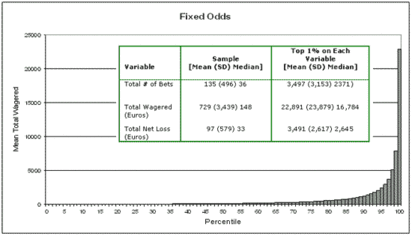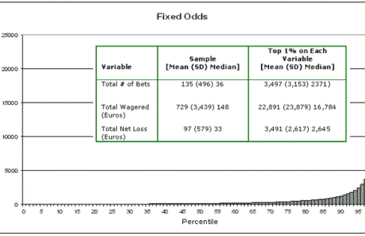Internet gambling has gained increasing public scrutiny during the past decade (see WAGER (12(4) and this week’s editorial), affecting policy, regulations, and public concern about its safety. There is little peer-reviewed research on Internet gambling, and the available research relies on retrospective self-report. This week, The WAGER presents the first ever research study of the actual betting behavior of a large cohort of Internet sports gamblers.
LaBrie and colleagues (in press) analyzed the actual betting behavior of the 40,499 sports gamblers who subscribed to the European Internet betting service, bwin Interactive Entertainment AG, during February 2005. Daily records of the deposits and betting transactions of these gamblers provided information during the next eight months for two types of sports wagers: fixed-odds and live-action. The current review focuses on the more typical bets on the outcomes of sporting events, fixed-odds bets.
Figure 1. Eight-Month Fixed-Odds Betting Behavior of the Sample and the Top 1%

The inset in Figure 1 shows the pattern of betting for the sample. Differences between the mean and median values demonstrate most bettors bet and lost smaller amounts than the average indicates. We found that betting activity in our sample was discontinuous; that is, a small number (1% for each variable; see Figure 1, for example) wagered and lost disproportionately high amounts.
Limitations of the current study include its use of subscribers to a single European online betting company, its inability to determine whether bettors were placing wagers on other online sites, and the absence of variables measuring participants’ financial situation. The results suggest that although the majority of the sample demonstrated moderate gambling behavior (e.g., a median loss of 33 Euros over eight study months), there is a group of online bettors (i.e., 1%) who demonstrate more excessive gambling behaviors. Future research on these gamblers is necessary to determine whether the gambling patterns of these very involved bettors are clinically relevant.
What do you think? Comments on this article can be addressed to Sarah Nelson at basis@basisonline.org.
References
LaBrie, R. A., LaPlante, D. A., Nelson, S. E., Schumann, A., & Shaffer, H. J. (2007 Online First). Assessing the Playing Field: A Prospective Longitudinal Study of Internet Sports Gambling Behavior. Journal of Gambling Studies.




